Yes, it has a shelf life. And the specs change, so it may not be compatible with your newest car. But dino oil also has a shelf life, which they say can only be determined by an analysis. I'd run it it older vehicles without worry.
You are using an out of date browser. It may not display this or other websites correctly.
You should upgrade or use an alternative browser.
You should upgrade or use an alternative browser.
Synthetic oil Shelf life
- Thread starter Narragansett
- Start date
The mil spec synthetic oil in the Air Force had a 20 year shelf life. We had about 70 deuces and 5-tons in our units inventory. We got a shipment of 19 year old oil with instructions to change all of the oil in all of the vehicles just to use it up. The oil got changed once a year or if "X" number of miles occurred before the year was up. In the late 90's we had a number of Deuces with less than 10k on the odometer but they had a delivery date to the Air Force in the early 70's.
My kids told me a few years ago, They didn't know we were poor, until they left home!
Me: What makes you thing we were poor?
35 year old daughter:We didn't have cable, and we grew our own vegetables!
Me: Ok, lets set the record straight. We were not poor. Poor people don't own their own home, poor people don't send their kids to privet schools, Only poor people can afford to eat all the junk food they want! We just didn't have lots of extra money, so we were broke. But we were never poor!
Just like my granddad used to say. They were poor but just didn't know it.
But dino oil also has a shelf life, which they say can only be determined by an analysis. I'd run it it older vehicles without worry.
It must be pretty stable. It's about 40 million years old before it's pumped out of the ground.
DWalt
Member
Just because some product has a "use by" date on it doesn't mean that it won't remain good far longer. For example, even bottled water has a "use by" date on it. About a month ago we discovered a canned ham in our storage pantry which had a 2010 "use by" date on it. No indication of spoilage, can was intact and not showing any pressure bulging, and it smelled and looked OK when the can was opened. We used it (wife ground it up and mixed it in with hamburger to make a meat loaf), and we're still alive.
I have a 1995 Ford Ranger 3.0 liter engine pick-up. I brought it used with 10,000 miles on it and now have well over 320,000 miles on the engine. I say well over 320,000 because the odometer broke several years ago at 320,000 and is running backwards now showing 310,000. I have used Mobil 1 5w30 Synthetic Oil in it from day one. A couple of weeks ago I had to put it in the shop and ended up with a $1,500 repair bill. However four new brakes were included in the bill. I had to argue a bit with my mechanic when I told him to put Mobil 1 synthetic oil back in it.
My point is I will take all of the "outdated" synthetic motor oil you have.
My point is I will take all of the "outdated" synthetic motor oil you have.
I am really dating myself on this, but I remember back in the 50s when many gas stations sold cheap motor oil in glass quart bottles with steel spouts on them - they looked sort of like milk bottles. I seem to remember a quart sold for about a quarter. I heard that it was just filtered used crankcase oil. It probably worked fine for those who had to add a quart or two of oil every time they filled up.
In the late 60's I worked at a Chevron Oil Co, owned station, for several years. The oil in the glass bottles was refinery fresh oil that shipped to us in 55 gallon drums. We sold it to the customer then refilled the bottles and put then back on the display rack. Nothing second tier about that oil.
DWalt
Member
In the late 60's I worked at a Chevron Oil Co, owned station, for several years. The oil in the glass bottles was refinery fresh oil that shipped to us in 55 gallon drums. We sold it to the customer then refilled the bottles and put then back on the display rack. Nothing second tier about that oil.
Could be refinery bulk oil. I remember the spouted motor oil bottles were kept in a rack near the gas dispensers, and if you needed to add a quart, you asked the attendant to do it. No self-service back in those days (at that time, at least in Ohio, self-service gas pumping was illegal), and station attendants pumped the gas, washed the windshield and checked the oil. You can still find those glass motor oil bottles on eBay, also lots of reproductions.
One other thing I remember, but involving oil cans in service stations. After a can was used (you would stick a spout in a can), the station would turn the can upside down in a pan and let the residual oil drain out. If you were doing many oil changes, I imagine you could easily recover several quarts of new oil a day for resale.
Last edited:
I think this is what DWalt and old bear are talking about. I can't
believe the glass is intact since I've had it since the mid sixties. I bought Sears Spectrum Oil in a 24 can case back then.
Looks like I'm dating myself also.
believe the glass is intact since I've had it since the mid sixties. I bought Sears Spectrum Oil in a 24 can case back then.
Looks like I'm dating myself also.
Attachments
-
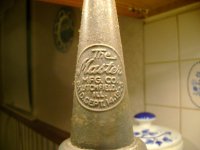 old oil bottle and oil can open and pour 001.jpg82.6 KB · Views: 29
old oil bottle and oil can open and pour 001.jpg82.6 KB · Views: 29 -
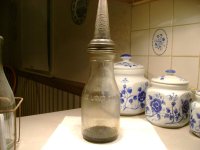 old oil bottle and oil can open and pour 002.jpg80.3 KB · Views: 32
old oil bottle and oil can open and pour 002.jpg80.3 KB · Views: 32 -
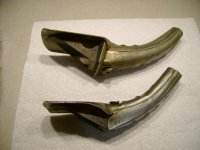 old oil bottle and oil can open and pour 003.jpg86.1 KB · Views: 25
old oil bottle and oil can open and pour 003.jpg86.1 KB · Views: 25 -
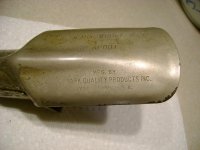 old oil bottle and oil can open and pour 004.jpg71.5 KB · Views: 28
old oil bottle and oil can open and pour 004.jpg71.5 KB · Views: 28 -
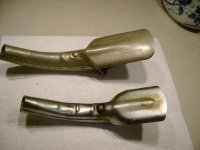 old oil bottle and oil can open and pour 005.jpg77.5 KB · Views: 25
old oil bottle and oil can open and pour 005.jpg77.5 KB · Views: 25
Never worried about oil expiring. Stuff has the shelf life of a Twinkie. Good for for decades. I firmly believe expiration dates are more about moving inventory and maintaining margins than the product degradation.
Since synthetic oil is an engineered molecule and not naturally occurring, it should be very stable. Take some of the synthetics we use with "environmentally friendly" drilling fluids, the synthetic is made from methane (natural) gas and I've never heard of it getting "stale" or changing characteristics. But for synthetic engine oil, I would image that if anything would degrade over time it would be the additive packages they add to the base oil and not the oil itself.
This is what I have been reading. The issues are with the additives
Expiration date on oil?? Reminds me of the bags containing "Himalayan" salt that is supposedly "millions of years old". The bags have an expiration date on them.
Fishslayer
US Veteran, Absent Comrade
Yup.. back in the day every Harley rider carried one of those spouts in the saddle bag. "Got any Valvoline 60W?" 
This Sunday we are having a celebration of my aunt and uncle's 60th wedding anniversary. I was at the wedding and I'm going to be at the party.
Similar threads
- Replies
- 18
- Views
- 2K

